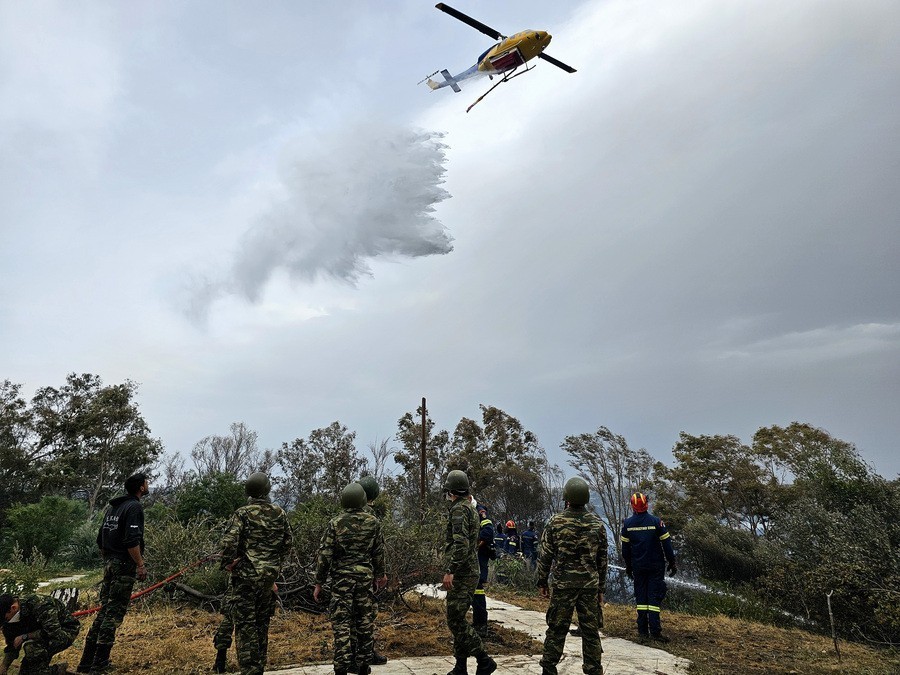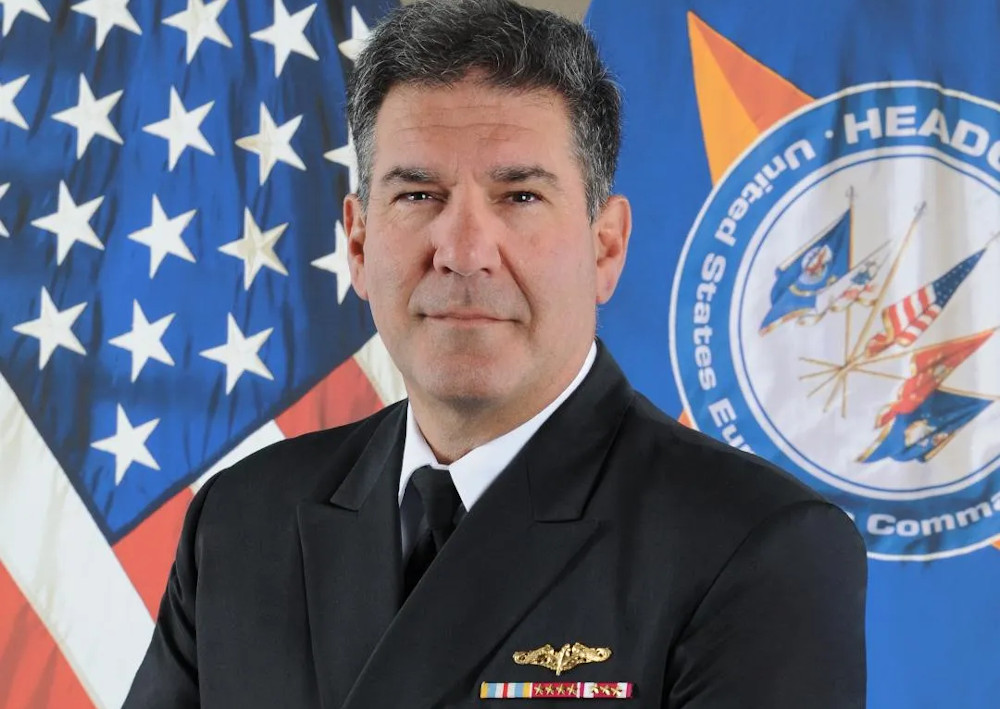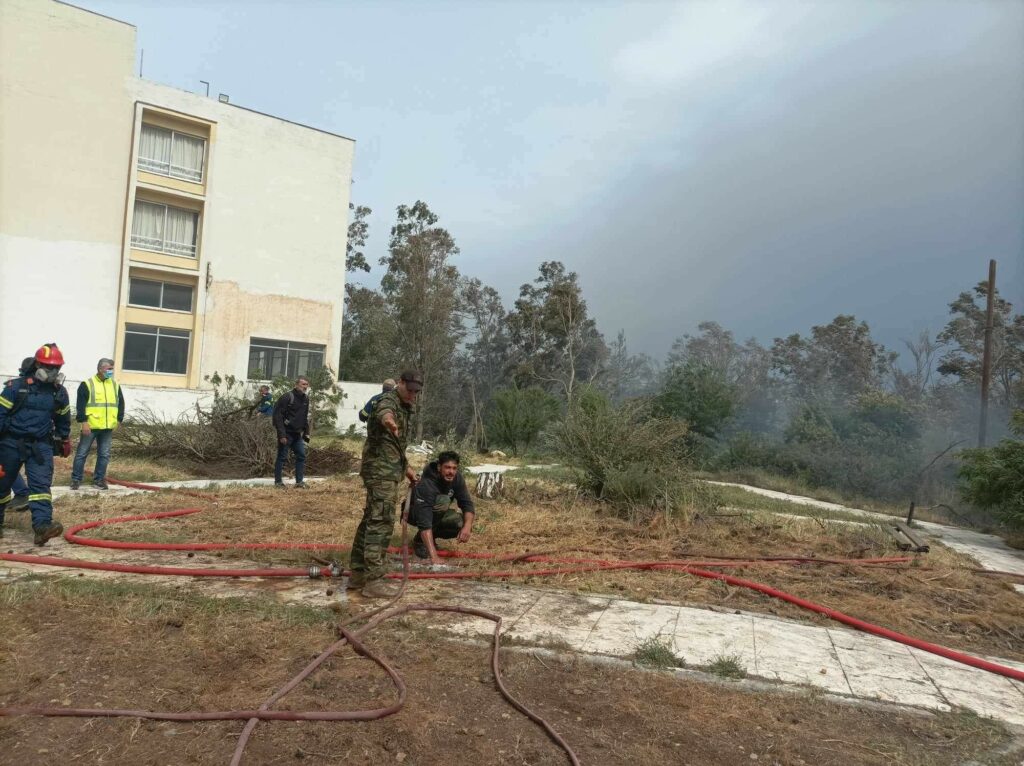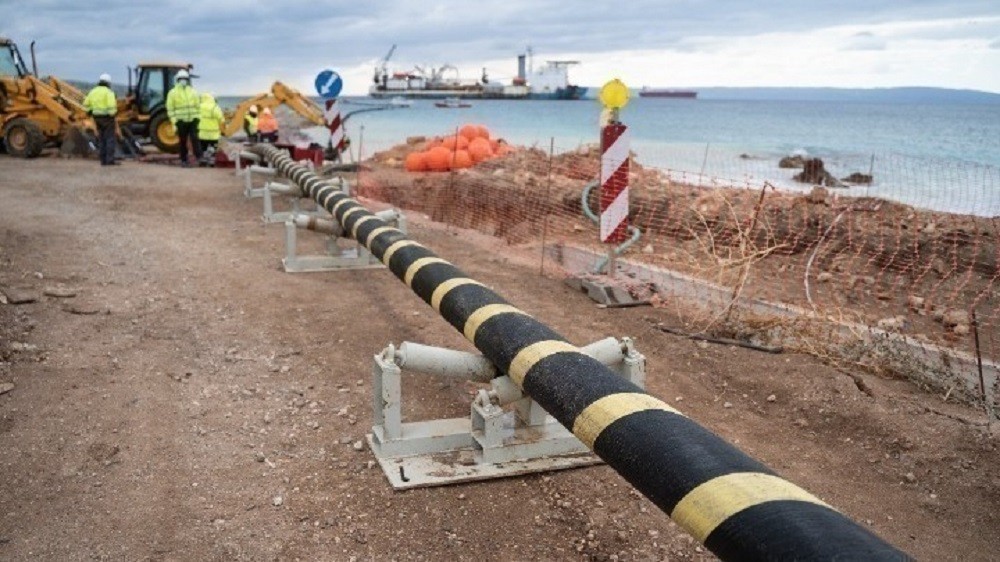
Greece and the U.S. relationship is strong and continuously growing, Rear Adm. Stamatopoulos says

Rear Adm. Peter Stamatopoulos, ape-mpe
Alexandroupolis and Souda Bay are examples of key infrastructure that the US rely upon, Rear Adm. Peter Stamatopoulos said in an interview with the Athens-Macedonian News Agency (ANA) released on Monday adding that the U.S. considers Greece to be a pillar of stability in this region.
He also underlined that the military relationship between Greece and the U.S. is strong and continuously growing.
Rear Adm. Stamatopoulos also welcomed Greece’s recent ratification of the update to the Mutual Defense Cooperation Agreement.
The full interview follows:
Q1: During your tours you have participated in various operations, some of them practically coinciding with the end of the Cold War such as Desert Storm, others covering the post-9/11 period. Rear Adm. Stamatopoulos, since we seem to be living in an era with shifting powers in an international level could you describe the ways in which the current period is presumably more, or maybe in some areas less, demanding for the U.S. Naval Forces?
A1: It is my privilege to have this interview with you and to discuss Greece’s important role in securing peace and prosperity in the 21st century. The U.S. considers Greece to be a pillar of stability in this region and our partnership at Souda Bay-both bilaterally and through NATO-to be critical to achieving our joint defense and security goals. No nation can confront today’s challenges alone, and as the European security environment continues to shift and resources are constrained, the U.S. appreciates the value of our allies and their contributions to regional security through their leadership and efforts to increase interoperability and collaboration.
Long ago, leaders recognized a country’s security and economic wellbeing depends upon a strong and capable naval power to protect sea lanes that enable access to international markets. Today, around 80% of global trade by volume and 70% by value are carried on ships – in total more than 52,000 merchant ships sail the planet’s seas, many of them owned or operated by Greek shipping companies. Worldwide ship traffic is up 400% in the last 25 years. All of this fuels economies around the globe. Bound only by geographic structure or “ choke points” such as the Straights of Gibraltar, Bosporus or Suez Canal, aboard these ships flows the “ lifeblood of economies”. However, this is not the full picture. Below the ocean’s surface lies a vast network of sea cables through which 99% of international communication, financial and internet traffic flows across the globe. So next time you think about “ the cloud” in reality you should consider our oceans. Europe remains the United States’ largest trading partner. So, yes, U.S. and NATO naval forces are in high demand and will remain so for the foreseeable future.
Q2: Tell us about the U.S. European Command and your duties as director of logistics (J4). There has been a lot of talk, since Desert Storm actually, that during the last three decades, even more compared to past times, wars, in all levels and intensities, are won via the power of logistics. Could you comment on that?
A2: U.S. European Command executes a full range of multi-domain operations throughout its 51 country area of responsibility, in coordination with allies and partners to support NATO, deter Russia, assist in the defense of Israel, enable global operations and counter trans-national threats. The command is comprised of approximately 70,000 soldiers, sailors, airmen, Marines and civilians.
U.S. European Command’s J4 directorate ensures U.S. support to our NATO Allies and European partners with a focused commitment on highlighting mobility throughout Europe. Additionally, U.S. and NATO allies constantly work together to create a logistics environment that optimizes support for the deployment and sustainment of a large combat force. Together, EU and NATO leaders are working hard to enable key logistics networks throughout Europe as a measure to reinforce our collective deterrence and defense. Access to Hellenic sea ports such as Alexandroupolis and Souda Bay are examples of key infrastructure we rely upon when we train and exercise with our allies and partners, and we welcomed Greece’s recent ratification of the update to our Mutual Defense Cooperation Agreement, which paves the way for expanded cooperation in Alexandroupolis, Souda Naval Base, Stefanovikio and Larissa. This is particularly important as we practice the joint reception, staging, onward movement and integration (JRSOI) for equipment and personnel to ensure we can execute the full range of combined and joint military operations and capabilities.
Q3: Concerning Hellenic-American relations, there have been a number of visits of US ships in Hellenic waters and ports. Are we going to see even more such visits? If so, what is the objective of the recurring presence of U.S. Naval forces and, apart from the media imprint and the gains in training, what are the gains for the general public from such US Naval presence?
A3: I can speak to the military relationship between Greece and the U.S., which is strong and continuously growing. I can also tell you with confidence every American Sailor who has been fortunate enough to make a port call in Hellenic territory absolutely loves the experience and warmth of the Greeks and greatly appreciates the longstanding relationship between our two nations. Greece has been a firm U.S. ally in every major conflict since its independence, so it remains a top priority that our armed forces train with each other. Only by working together can we develop a high degree of interoperability, familiarity and strengthen relationships through training, exercises and port visits. Both our countries and our citizens, along with our NATO allies, have a mutual commitment to promote peace and stability in the region.
Q4: Could you elaborate on the importance for NATO and the U.S. of Souda Bay in Crete and, since this seems to be a port of increased importance lately, the port of Alexandroupolis?
A4: The answer begins with location, location and location. Both have deep water harbors capable of accommodating the largest U.S. and NATO ships. The U.S. utilizes Naval Support Activity (NSA) Souda Bay and the NATO Marathi Pier Complex in Souda Bay, Crete, for various operations, exercises and crisis response events around the world. The Souda Bay military complex is used to support combat readiness, provide logistics support and quality of life port visits for personnel and ships, and is a secure location for the conduct of periodic maintenance on ships, submarines and aircraft. The longstanding access and basing afforded to the U.S. and NATO by Greece remains the cornerstone of our mutual and collective defense relationships in the region. Most recently, the US assisted Greece in a $ 2.3 million project to remove a sunken dredger at the Port of Alexandroupolis to the benefit of both nations. Immediately after the removal was completed, the USNS Carson City was the first U.S. military ship to ever dock in Alexandroupolis, and we look forward to using the port more frequently, including during the DEFENDER 2021 exercise next year.
Q5: Lastly, we are traveling through rough seas lately as far Hellenic-Turkish relationships are concerned. As director of logistics (J4) for the U.S. European Command you are aware of this current period of tension, could you comment on this current state of affairs? Moreover, the Hellenic Navy has expressed interest in receiving various possible naval units and/or equipment from the U.S., naval units which could contribute to its modernization as we are a country which is just exiting a period of grave economic woes and have limited resources. Should we expect any developments there?
A5: In the context of our work together as NATO allies, we see much value in cooperation with both Greece and Turkey, and my general experience is that we are all stronger together and that sentiment is shared by my counterparts in both countries.
While I won’t speculate on future basing or force structure changes, including potential military sales, we do have a commitment at the highest level to seek opportunities to continue developing our defense relationship and security cooperation. The U.S. and Greece, as NATO allies, have a mutual commitment to promote peace and stability in the region, which was reaffirmed recently when Prime Minister Mitsotakis and President Trump met. Through our southern exercise portfolio, we continuously look for opportunities to work with Greece and to build the commercial relations necessary to support and enable military operations.
Source: ANA-MPA
Greece should be the keeper of the Parthenon marbles, Washington Post article claims

